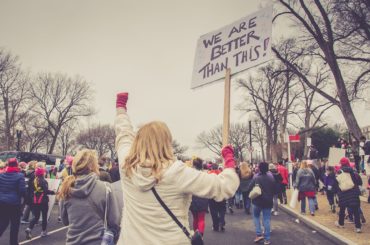
Editor’s Note: We are reprinting this essay, which first ran in 2019, because we feel it is helpful in the current cultural conversation.
For many non-Black folks, performative allyship is a time to scream from social media rooftops about how they are not racist or are simply down for the cause. Performative allyship is where many, specifically White folks, attempt to distance themselves from more problematic white people and the institution of white supremacy at large. However, doing so doesn’t create more justice for Black folks, it just charges in and uses power and privilege to passively opt out of responsibility for the impacts of that power and privilege.
It is not enough to simply distance oneself from the perception of racism. True allyship is actively anti-racist.
It is not enough to simply distance oneself from the perception of racism. True allyship is actively anti-racist. It is to deconstruct the anti-Blackness in our society at large and do something about it in our interpersonal relationships, churches, fellowships, communities, workplaces, and campus. It is to call representatives to demand justice for Black folks. It is voting in a way that benefits your Black neighbors. It is gathering your community of people that aren’t as far along as you are and doing the work of educating. Performative allyship or wokeness is clamoring noise with no impact. It is words with no deeds. It is ideology without integrity.
Allies must do the hard work of listening, learning, and amplifying others. Of paying the cost for standing against anti-blackness, not just looking like a woke or educated social justice warrior. Of honoring Paulo Freire’s a Pedagogy of the Oppressed: to act and reflect over and over again until liberation comes. This is the process of being thoughtful in our actions directed against oppression and then doing the necessary reflection on those actions and the system in order to move liberative movements forward. What we seek is transformation not simply empty verbalism, or ineffective or disembodied activism. Action and reflection directed at oppressive systems and structures. This is hard work, it is emotional work, and it is necessary work.
Justice work is like being in a boat together. True allyship plays a part, does the work, and contributes to things moving forward. Performative allyship leaves when it seems like the boat might be going down or be costly. Allies are part of powering the boat, for sure, but not simply loungers along for the ride to gain justice accolades. Allies are people who help power the vessel without feeling the need to steer it or to appear more helpful than they are.
Practically, this looks like ignoring a racial incident in the moment but commenting on it to a friend of color in private afterward. It looks like posting on social media about Black Lives Mattering but never showing up to demonstrations. It looks like reading all of Baldwin’s work, quoting it, but not engaging deeply with the intersection of anti-blackness and homophobia.
Allies are people who help power the vessel without feeling the need to steer it or to appear more helpful than they are.
Being an ally takes resilience. It takes the willpower to continue doing the work, an inner life that can withstand being misunderstood, a willingness to constantly receive feedback, and a constantly deepening knowledge of power and privilege. To be sure, this is all hard, but it is not harder than experiencing the day-to-day, ongoing trauma of anti-blackness in the world.
For non-Black folks, your job is not to appear “woke.” It is not to say the right thing. It is to do your work: unroot anti-blackness in yourself however you can, and use any platform that you have to turn the spotlight from your own perceived efficacy to Black voices. Black voices get to be the authority on Black history. Allies get the chance to participate—not for the sake of ego inflating or getting hearts, likes, and retweets, but for the sake of all of our liberation that comes when we deconstruct anti-blackness.
So, the invitation for most of y’all is not to simply say the right things, it is to say the right things to the right people. Non-Black folks have the opportunity to “get your people,” to use your words and energy to make space for greater liberation, not simply take up space with justice jargon.
 Brandi Miller is a campus minister and justice internship director in the northwest. She exists and writes at the intersection of faith, justice, and politics to curate content that moves the Church forward in living out the holistic gospel.
Brandi Miller is a campus minister and justice internship director in the northwest. She exists and writes at the intersection of faith, justice, and politics to curate content that moves the Church forward in living out the holistic gospel.


